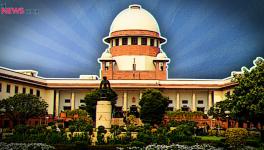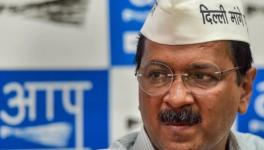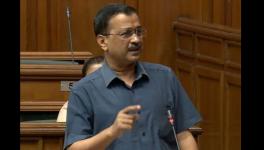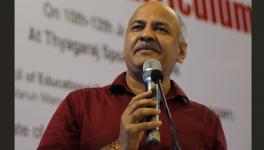Delhi: Modi Govt’s New Power Grab Model
Representational use only.
On March 15, the Central government introduced a Bill in Parliament to amend the existing law governing rights of the Delhi Legislative Assembly. Delhi is a Union Territory with an elected legislative Assembly and its own government. It does not have full powers like any other State government, but still, it does provide some democratic control over governance of the national Capital Territory, with nearly 2 crore population.
Barring law and order and land, all other subjects can be legislated and acted upon by the elected government of Delhi. This arrangement is now sought to be shifted in favour of the Central government through the new changes.
This move is yet another component of the long- drawn tug of war between the Bharatiya Janata Party-led Central government and Arvind Kejriwal’s Aam Aadmi Party-led Delhi government.
The BJP has lost three successive elections to the AAP, the last two decisively. This people’s mandate has never been accepted by the BJP and it has continuously tried to obstruct the functioning of the Delhi government, leading to exhausting logjams and political rancour.
With the latest move, the Modi-led Central government seeks to settle the issue once and for all. It increases the powers of the Lieutenant Governor (appointed by the Central government) and limits the powers of the elected government. This is nothing short of a power grab.
What is the new law?
The new law, called the “Government of National Capital Territory of Delhi (Amendment) Bill, 2021” will amend certain provisions of the original law called “Government of National Capital Territory of Delhi Act, 1991 (1of 1992)” passed by Parliament in 1992. These are:
1. Section 21 of the original act will be changed to include a sub section that says that the word “Government” will mean the Lieutenant Governor (LG). So, all laws passed by the Delhi government will need to have the approval of the LG.
In such a case, why have the Assembly at all? The whole purpose of the 1991 law, which led to the creation of Delhi’s Assembly and its elected government, was to end the rule by Centre-appointed bureaucrats. It was a culmination of years of struggle, in which, ironically BJP itself was thoroughly involved. In fact, it won the first Assembly election. But that was then. Now, with Modi and Amit Shah at the Centre, it is a nuisance to have a different party controlling the Capital, right under their noses.
2. Section 24 of the original law specified some specific matters on which the Lt Governor may not give his assent. These included matters like those which intrude upon the powers of the High Court. In the new law, the Modi government is adding a new clause, expanding the power of the LG to withhold assent on anything that he/she may think is beyond the power of the Assembly.
This is a blanket license being given to the LG to obstruct anything that doesn’t suit the political interests of the BJP government at the Centre. In the past, the LG has held up or delayed various plans of the Delhi government, including the mohalla clinics, the doorstep delivery of ration, free electricity and water, etc.
3. Section 33 of the original law laid down that the Delhi Assembly had the power to decide how to conduct its business. It also said that the LG could restrict some things in consultation with the Speaker, and with the assent of the President.
The new law punches two holes into this. One, it specifies that the rules of business that the Delhi Assembly makes for itself “shall not be inconsistent with the Rules of Procedure and Conduct of Business in House of People". This means that it has to follow the Lok Sabha in doing its business. And the second one is a proviso which clearly specifies that the Assembly (or its committees) cannot consider or enquire into any “day to day” administrative actions.
In other words, the Delhi Assembly cannot question decisions taken by bureaucrats acting at the behest of the Central government even if they involve “day to day” administration. With no power over these matters, the Assembly (and the Delhi government) will become just a spectator to whatever the Central government and its nominee, the LG, do in Delhi.
4. Section 44 of the original law deals with conduct of business and powers of LG. The new law adds a proviso that for taking “any action” on a decision taken by the council of ministers, a minister, state government, LG etc., the “opinion” of LG must be taken. The LG will issue a list of matters on which his opinion is mandatory.
This again severely limits the rights of the Assembly and the elected government of Delhi, and hands over complete power to the LG.
Earlier Supreme Court Judgements
Such was the paralysis between the state and Central governments in the 2014-2018 period that the matter went to court. In 2017, the apex court said that as per law, the LG enjoys supremacy over the state government but it advised the LG to engage positively and constructively so that the state government functions smoothly. It went to the extent of saying that LG should not sit on the files sent to him for approval or opinion. This was not the final word as several larger constitutional issues remained hanging fire and the matter went to a Constitution Bench.
In July 2018, the Supreme Court had laid down that the LG should act on the advice of the state government and the latter need not wait for the concurrence of the LG for all its decisions. This had laid to rest the bitter battle that had been going on between the elected government and the LG as representative of the Central government. Although all matters were not resolved but largely, this demarcated the lines of authority.
The new law appears to be a move by the Central government to change this equation established by the apex court. It again shifts the power centre – much more decisively – back to the Central government.
Also read: The Scent of Power: A Timeline of BJP’s Power Grab in States
New Model of Power Grab
The BJP has a long track record of trying to get power in states through a whole arsenal of means. In the past, the country has seen the bizarre spectacle of BJP losing an election in a state and yet coming into power by induction of ‘rebels’ (defectors) from the winning side. This happened in Arunachal Pradesh (2014), Bihar (2015), Karnataka (2019), Madhya Pradesh (2020). Recently, in Puducherry, the BJP did the same thing causing the government to fall weeks before Assembly elections were due and now the election process is underway, under the Lieutenant Governorship of a BJP politician from Tamil Nadu.
Besides this, there is the other model of cobbling together an alliance after election results have come out and they have lost. The BJP’s unlimited resource base undoubtedly helps in getting together a flock of small parties. This was seen in Jharkhand (2014), Goa (2017), Manipur (2017), Meghalaya (2018), and Haryana (2019).
The Delhi move is a new way of ambush: change the law and rule by proxy of the Central government. It is a dangerous portent for not just Delhi but for the whole country. It shows that the BJP is not hesitant in using its majority in Parliament to change laws just to get more power in states. In Jammu & Kashmir, it did this while abrogating Article 370, dividing the state into two Union Territories and imposing a long lockdown- cum-internet shutdown to prevent protest.
In Delhi, this won’t be so easy because the incumbent AAP government has considerable support and it has swiftly denounced the new law.
Get the latest reports & analysis with people's perspective on Protests, movements & deep analytical videos, discussions of the current affairs in your Telegram app. Subscribe to NewsClick's Telegram channel & get Real-Time updates on stories, as they get published on our website.
























